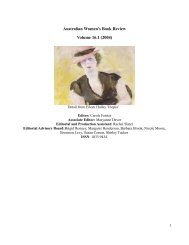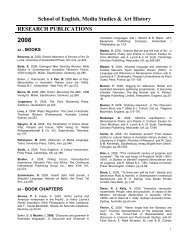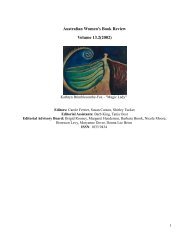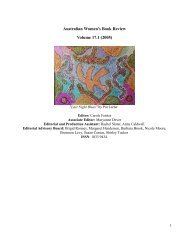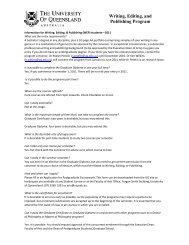Australian Women's Book Review Volume 14.1 - School of English ...
Australian Women's Book Review Volume 14.1 - School of English ...
Australian Women's Book Review Volume 14.1 - School of English ...
You also want an ePaper? Increase the reach of your titles
YUMPU automatically turns print PDFs into web optimized ePapers that Google loves.
chapter <strong>of</strong>fers an excellent summary <strong>of</strong> the ways in which Western religious traditions, specifically<br />
Christianity but also more recent feminist, ecological and new age spiritualities, perpetuate a desire for<br />
another world which is at odds with Aboriginal spiritualities as McDonald presents them. Her reading<br />
<strong>of</strong> Aboriginal Christianity informs her appraisal <strong>of</strong> these traditions very well.<br />
While I found Blood, Bones and Spirit engaging, it raised a few questions for me. First, I wondered to<br />
what extent McDonald's articulation <strong>of</strong> the contrast between Aboriginal and Western Christian<br />
worldviews reinstated the kind <strong>of</strong> dualistic framework that has undergirded Western philosophy and<br />
theology. As McDonald herself indicates, this dualistic mode <strong>of</strong> thought can be found in contemporary<br />
Aboriginal distinctions between 'blackfella' and 'whitefella' and between 'Aboriginal way' and 'gardiya<br />
way' (p. 182), and it is perhaps from here that she takes them for her study. Second, I felt that the voices<br />
<strong>of</strong> her Aboriginal informants were somewhat muted by the weight <strong>of</strong> interpretation traditional in a<br />
scholarly study <strong>of</strong> this kind. The book carries twelve pages <strong>of</strong> coloured photographs, one <strong>of</strong> the hilly<br />
country around Halls Creek, the remainder <strong>of</strong> local Aboriginal people mostly engaged in everyday<br />
food-gathering and other subsistence activities such as cleaning out a water hole. While the<br />
photographs are beautiful in themselves, and in a sense <strong>of</strong>fer portraits <strong>of</strong> the people among whom<br />
McDonald conducted her study, I was unclear about precisely how these images were meant to<br />
complement the text, except perhaps to affirm that despite the ravages <strong>of</strong> colonisation the Aboriginal<br />
people remain embedded in country. But I was left wondering in what ways McDonald's Gija and Jaru<br />
informants benefited from her study. There seemed to me to be less transparency on this point than, for<br />
example, in Deborah Bird Rose's Dingo Makes Us Human: Life and Land in an <strong>Australian</strong> Aboriginal<br />
Culture (1992).<br />
Nevertheless, this is a timely study. In Australia the percentage <strong>of</strong> Aboriginal people who claim<br />
adherence to Christianity is significantly higher than that <strong>of</strong> the non-Aboriginal population. If we are to<br />
respect this aspect <strong>of</strong> contemporary Aboriginal life, we need to avoid assuming that Aboriginal<br />
Christianity is a carbon copy <strong>of</strong> Western Christianity. Blood, Bones and Spirit <strong>of</strong>fers a nuanced<br />
approach to the question <strong>of</strong> the way in which Gija and Jaru people make sense <strong>of</strong> a religious tradition,<br />
namely Christianity, which emerged in a situation quite different from both their pre-colonial and<br />
colonial experiences. McDonald claims that within the AOG and UAM Aboriginal adherents remain<br />
colonised. At another point she presents a narrative <strong>of</strong> post-colonial resistance within the local Catholic<br />
community (p. 88). But none <strong>of</strong> this is over-simplified. The continuing efficacy <strong>of</strong> Aboriginal spiritual<br />
practices, the uses <strong>of</strong> Christianity by Aboriginal adherents to counter the extra-Christian colonising<br />
practices <strong>of</strong> the State and to alleviate some <strong>of</strong> the violent legacies <strong>of</strong> colonisation, as well as the<br />
prevailing importance <strong>of</strong> the land suggest that the ongoing processes <strong>of</strong> colonisation are not absolute,<br />
but neither are they to be ignored.<br />
Anne Elvey is an Honorary Research Associate in the Centre for <strong>Women's</strong> Studies and Gender<br />
Research at Monash University. Her research interests include ecological, feminist and postcolonial<br />
approaches to biblical interpretation. She has also studied at the United Faculty <strong>of</strong><br />
Theology and the Melbourne College <strong>of</strong> Divinity.<br />
Bobbi Sykes, Love Poems and Other Revolutionary Actions (St Lucia: University <strong>of</strong> Queensland Press,<br />
1988) 17.<br />
70



